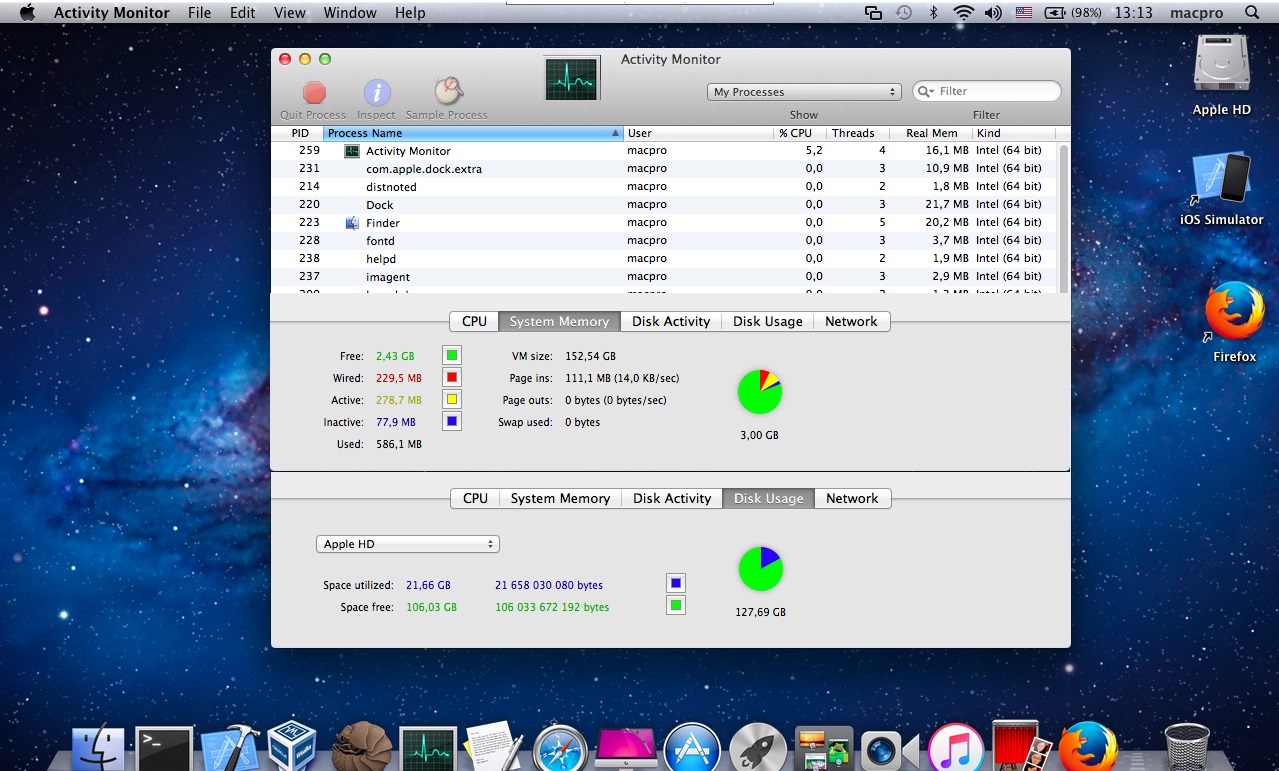
revision L54
Why did I decided to choose this particular OS distribution?..
Alpine Linux is good for remote education because everyone can choose a convenient way to get acquainted with this OS.
I will perform the installation for the 32-bit version, since the computer on which the installation is being done is very old:
$ sysctl -a | grep brand
machdep.cpu.brand_string: Intel(R) Core(TM)2 CPU T7400 @ 2.16GHz
machdep.cpu.brand: 0

I will install it on VirtualBox from the image here:
Google: alpine linux download
Previous Releases
Older releases are found here.
alpine-virt-3.13.1-x86.iso
There is nothing unusual about creating a VM:
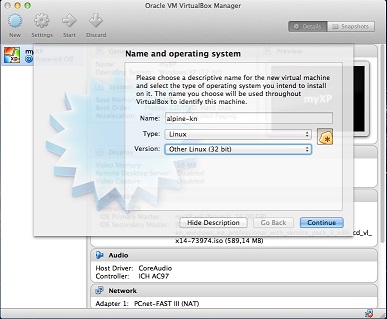
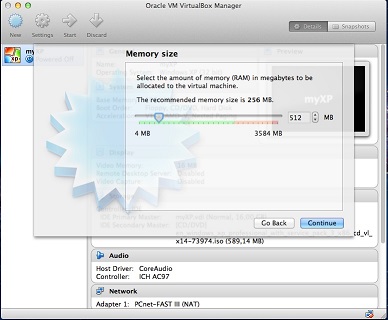
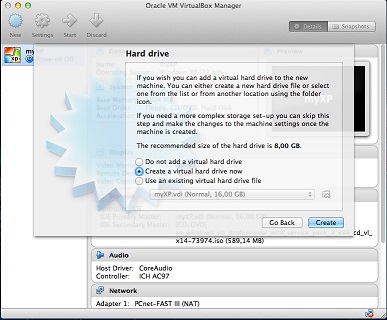
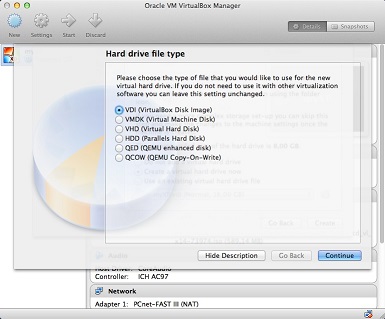
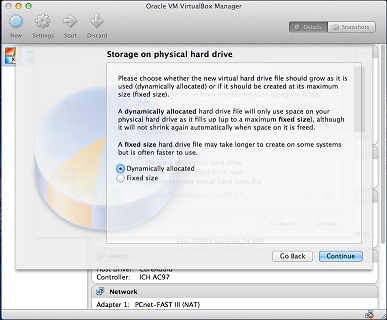
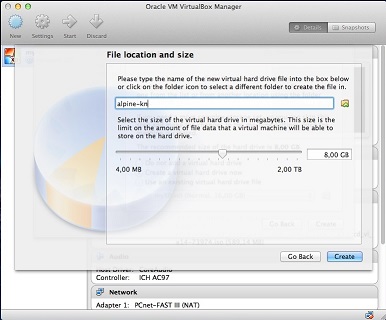
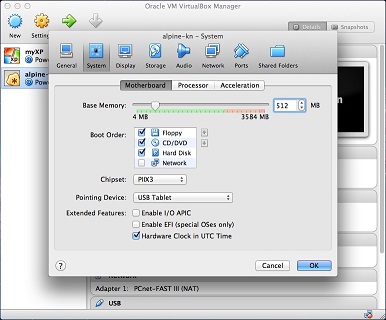
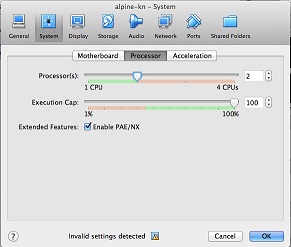
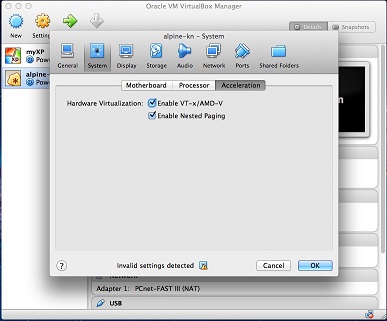
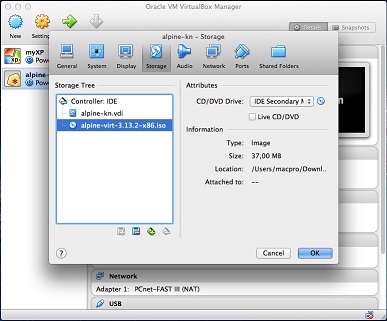
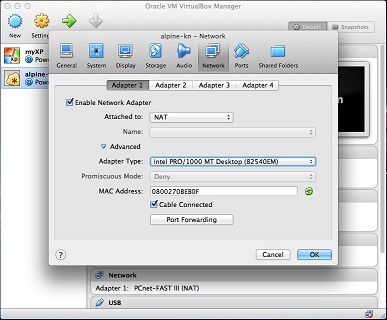

During the installation process, you should log in to the live system as root without a password and run the installation script called setup-alpine and answer a number of questions `
localhost:~# setup-alpine
Available keyboard layouts:
af br dz gr it lv nl si uz
al brai ee hr jp ma no sk vn
am by epo hu ke md ph sy
ara ca es id kg me pk th
at ch fi ie kr mk pl tj
az cm fo il kz ml pt tm
ba cn fr in la mm ro tr
bd cz gb iq latam mt rs tw
be de ge ir lk my ru ua
bg dk gh is lt ng se us
Select keyboard layout [none]:
Enter system hostname (short form, e.g. 'foo') [localhost]: alpine-kn
Available interfaces are: eth0.
Enter '?' for help on bridges, bonding and vlans.
Which one do you want to initialize? (or '?' or 'done') [eth0]
Ip address for eth0? (or 'dhcp', 'none', '?') [172.18.68.132] dhcp
Do you want to do any manual network configuration? [no]
Changing password for root
New password:
Bad password: too short
Retype password:
passwd: password for root changed by root
Which timezone are you in? ('?' for list) [UTC]
HTTP/FTP proxy URL? (e.g. 'http://proxy:8080', or 'none') [none]
Which NTP client to run? ('busybox', 'openntpd', 'chrony' or 'none') [chrony] none
Available mirrors:
1) dl-cdn.alpinelinux.org
2) uk.alpinelinux.org
..
55) alpine.ccns.ncku.edu.tw
r) Add random from the above list
f) Detect and add fastest mirror from above list
e) Edit /etc/apk/repositories with text editor
Enter mirror number (1-55) or URL to add (or r/f/e/done) [1]:
Added mirror dl-cdn.alpinelinux.org
Updating repository indexes... done.
Which SSH server? ('openssh', 'dropbear' or 'none') [openssh]
Available disks are:
sda (34.4 GB Msft Virtual Disk )
sr0 (1.1 GB Msft Virtual CD/ROM )
Which disk(s) would you like to use? (or '?' for help or 'none') [none] sda
The following disk is selected:
sda (34.4 GB Msft Virtual Disk )
How would you like to use it? ('sys', 'data', 'lvm' or '?' for help) [?] sys
100% ███████████████████████████████████████████████████████████
WARNING: The following disk(s) will be erased:
sda (34.4 GB Msft Virtual Disk )
WARNING: Erase the above disk(s) and continue? [y/N]: y
Creating file systems...
Installing system on /dev/sda3:
/mnt/boot is device /dev/sda1
100% ███████████████████████████████████████████████████████████
==> initramfs: creating /boot/initramfs-lts
/boot is device /dev/sda1
Installation is complete. Please reboot.
alpine-kn:~#
It remains to remove the boot disk and restart the virtual computer.
To establish an ssh connection, you need to open the port 22 on Alpine Linux and allow the login for root.
/etc/ssh/sshd_config
Port 22
..
AllowRootLogin yes
Then restart the sshd daemon:
rc-service sshd restart
If the rc-service command does not exist, install:
apk add openrc
On the host comuter, you may need to delete the file in the folder with bent keys, I have this one C:\Users\alien\.ssh\known_hosts
Choose from what is offered in the repository
apk info | wc -l
apk add --no-cache git ed bash zsh
apk add --no-cache perl python3
apk add --no-cache mandoc man-pages
apk add --no-cache musl-dev gcc
looking for answers to questions we may have about packages here:
google: alpine packages
https://pkgs.alpinelinux.org/contents
VirtualBox 4: Intel PRO/1000 MT Desktop (82450OEM) VirtualBox 6: Intel PRO/1000 MT Desktop (82450OEM)
alpine:~# ping 1.1.1.1 -c 2
PING 1.1.1.1 (1.1.1.1): 56 data bytes
64 bytes from 1.1.1.1: seq=0 ttl=58 time=9.557 ms
64 bytes from 1.1.1.1: seq=1 ttl=58 time=7.533 ms
--- 1.1.1.1 ping statistics ---
2 packets transmitted, 2 packets received, 0% packet loss
round-trip min/avg/max = 7.533/8.545/9.557 ms
alpine:~# ip a
1: lo: <LOOPBACK,UP,LOWER_UP> mtu 65536 qdisc noqueue state UNKNOWN qlen 1000
link/loopback 00:00:00:00:00:00 brd 00:00:00:00:00:00
inet 127.0.0.1/8 scope host lo
valid_lft forever preferred_lft forever
inet6 ::1/128 scope host
valid_lft forever preferred_lft forever
2. eth0: <BROADCAST,MULTICAST,UP,LOWER_UP> mtu 1500 qdisc mq state UP qlen 1000
link/ether 00:15:5d:01:a0:17 brd ff:ff:ff:ff:ff:ff
inet 172.23.90.157/20 scope global eth0
valid_lft forever preferred_lft forever
inet6 fe80::215:5dff:fe01:a017/64 scope link
valid_lft forever preferred_lft forever
alpine:~# ping google.com -c 2
PING google.com (216.58.207.238): 56 data bytes
64 bytes from 216.58.207.238: seq=0 ttl=114 time=15.661 ms
64 bytes from 216.58.207.238: seq=1 ttl=114 time=15.558 ms
--- google.com ping statistics ---
2 packets transmitted, 2 packets received, 0% packet loss
round-trip min/avg/max = 15.558/15.609/15.661 ms
/etc/resolv.confalpine:~# cat /etc/resolv.conf
search mshome.net
nameserver 192.168.1.1
alpine:~# cat /etc/apk/repositories
#/media/cdrom/apks
http://dl-cdn.alpinelinux.org/alpine/v3.13/main
#http://dl-cdn.alpinelinux.org/alpine/v3.13/community
#http://dl-cdn.alpinelinux.org/alpine/edge/main
#http://dl-cdn.alpinelinux.org/alpine/edge/community
#http://dl-cdn.alpinelinux.org/alpine/edge/testing
Note. On some 'Debian' virtual machines running on Windows laptops and networking via Wi-Fi, it was only possible to contact the host through the second network interface, which was located in the virtual network 'Host Only' (VirtualBox). The details of such case are shown on picture below:
http://kirill.tpt.edu.ee/html/image/HostOnly.png
In case of Alpine, the network interfaces are configured here:
alpine:~# cat /etc/network/interfaces
auto lo
iface lo inet loopback
auto eth0
iface eth0 inet dhcp
hostname alpine-kn
auto eth1
iface eth1 inet static
address 192.168.1.150/24
gateway 192.168.1.1
.ova) file, took here:(link is down) http://kirill.tpt.edu.ee/big/Alpine-x86-64-L35.ova
$ touch kn-13.c
$ ed kn-13.c
a
#include <stdio.h>
int main() {
printf("almost there..\n");
}
.
w
q
I'm writing/copy-pasting my source code in ed. if ed responds with ?, it means it does not understood me, does not found requested piece of text, etc.
Now let'screate a binary and install it.
$ bash
$ gcc kn-13.c -o kn-13
$ echo $PATH
/usr/local/sbin;..
$ mv kn-13 /usr/local/bin
$ kn-13
almost there..
$
makeA Simple Makefile Tutorial. The original article is here:
http://www.cs.colby.edu/maxwell/courses/tutorials/maketutor/